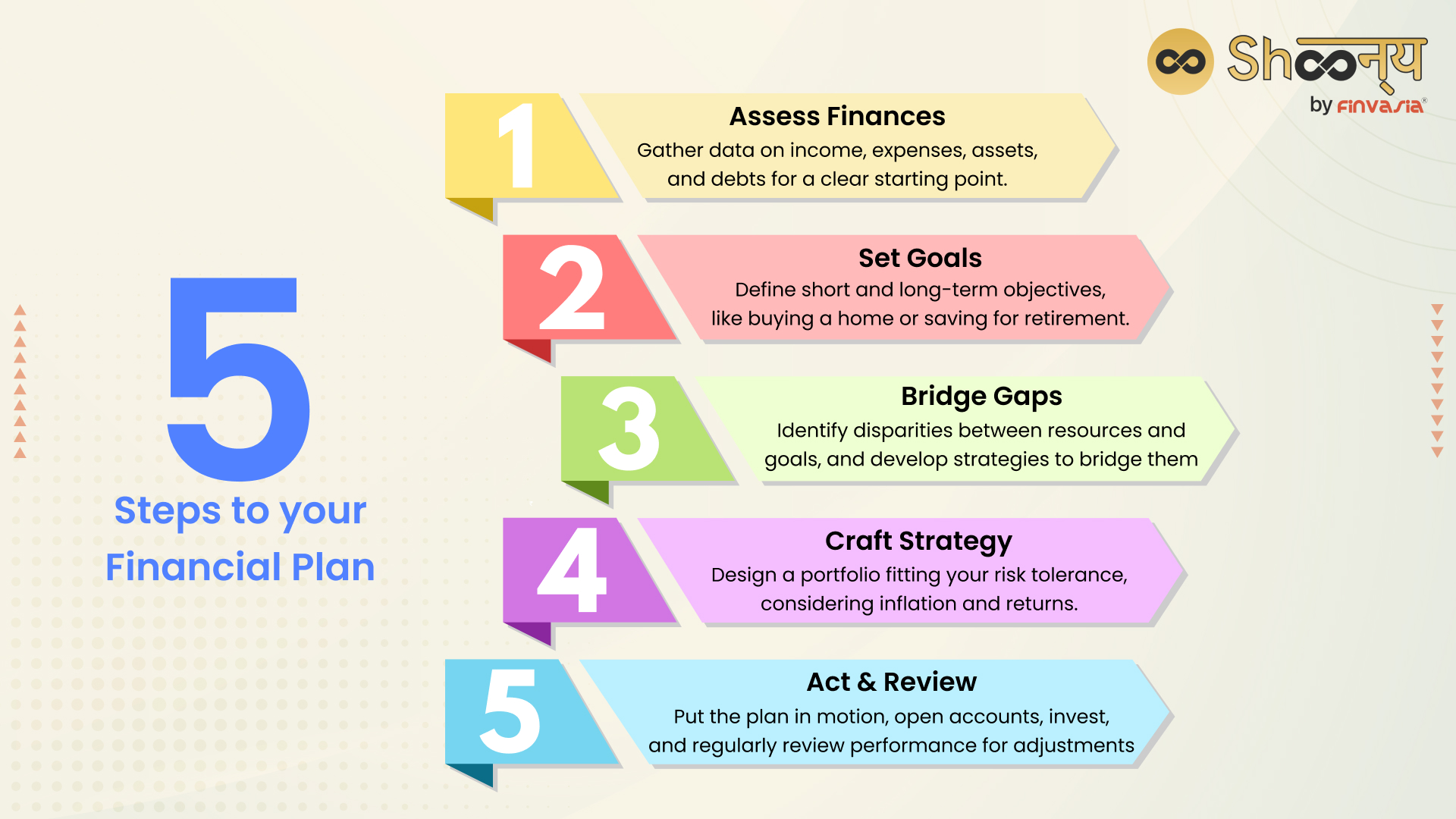Personal financial planning is a strategic process that empowers individuals to navigate their financial journey effectively. This comprehensive approach takes into account your financial resources, goals, and risk tolerance to create a roadmap for achieving your aspirations. Let’s delve into the significance of personal financial planning and how it shapes your financial well-being.
Understanding the Essence of Financial Planning
Importance of Personal Financial Planning
Personal financial planning is the cornerstone of a secure and prosperous future, especially for Indian investors. Here’s why it matters:
- Clear Goals: Financial planning helps you define short and long-term goals, like buying a home, funding education, or retiring comfortably.
- Budgeting: It empowers you to create a realistic budget that aligns with your income and expenses, ensuring you live within your means.
- Emergency Preparedness: Life is unpredictable. A well-planned financial strategy includes an emergency fund to cover unexpected expenses.
- Debt Management: Proper planning enables you to manage debt effectively, avoiding unnecessary interest payments and maintaining a good credit score.
- Investment Strategy: By aligning investments with your goals and risk tolerance, you maximise returns and create wealth over time.
- Retirement Readiness: Planning early ensures a comfortable retirement, allowing you to maintain your lifestyle and fulfil your dreams.
Financial Security: A solid plan offers a safety net, protecting your loved ones in case of unforeseen events.
5 Steps to Your Financial Plan

Navigating Through the Financial Planning Process
Understanding Your Financial Situation
Personal financial planning begins by assessing your income, assets, and liabilities. This understanding enables you to gauge your current financial standing and identify areas for improvement.
Strategic Goal Setting and Achievement
The process involves setting both short-term and long-term goals. Whether it’s buying a house, funding education, or planning for retirement, financial planning aligns your resources to achieve these aspirations systematically.
Mastering Debt Management Strategies
By evaluating your financial obligations, you can create strategies to manage and eliminate debt efficiently. This ensures that debts don’t hinder your overall financial health.
Unleashing Wealth Creation and Growth
Through careful investment planning, financial planning helps your money work for you. It guides you to choose the right investment vehicles, paving the way for wealth accumulation and growth over time.
Informed Decision-Making
Financial planning equips you with the knowledge needed to make informed choices. Whether it’s optimizing tax strategies or selecting appropriate insurance, you’re empowered to make decisions that align with your goals.
Ensuring Security and Preparedness
Having a solid financial plan offers a safety net during unexpected events. It prepares you for emergencies, ensures financial stability in retirement, and safeguards your loved ones’ future through proper estate planning.
Building a Strong Personal Finance Strategy
A solid personal finance strategy serves as a cornerstone for a secure financial future. Let’s delve into key steps to help you build a sturdy financial foundation:
- Budgeting and Keeping Tabs on Expenses: Kickstart your strategy by shaping a monthly budget that designates your income to various expenditures. Picture this: if your monthly income is ₹50,000, designate ₹20,000 for rent, ₹10,000 for groceries, ₹5,000 for transportation, and so forth. To keep a vigilant eye on your spending, turn to nifty mobile apps or spreadsheets, which serve as loyal companions in adhering to your financial blueprint.
- Creating an Emergency Cushion: Every robust strategy has a contingency plan. Establish an emergency fund to shield yourself from unexpected expenses. The target? Aim for an emergency fund equivalent to 3-6 months of living expenses. If your monthly outlay totals ₹30,000, your emergency fund should hover between ₹90,000 and ₹1,80,000. This financial cushion extends a safety net during unforeseen economic storms.
- Tackling Debt with Finesse: Conquer the high-interest debt battleground by prioritizing payments on debts that bear hefty interest rates—think credit card balances or personal loans. Imagine, for instance, a credit card debt of ₹20,000 tagged with a 15% interest rate. Swiftly eliminating this debt avoids the relentless accrual of interest.
- Investment Aligned with Objectives: Tailor investments to harmonize with your financial aspirations. For near-term targets like a dreamy vacation, consider vehicles like fixed deposits or short-term debt funds. However, if your gaze is fixed on retirement, mull over equity mutual funds for their potential to yield substantial returns over the long haul.
- Mapping Out Retirement: Begin the retirement saving odyssey in the early stages by chipping into a Provident Fund (PF) or the National Pension System (NPS). For a tax-savvy approach, contemplate delving into options like Equity-Linked Savings Schemes (ELSS), which reap tax deductions while cultivating your retirement nest egg.
- The Art of Diversification: Sprinkle your investments across diverse avenues to mitigate risk. Venture into a blend of assets—stocks, bonds, real estate, and more. Imagine designating portions of your investment mix to equity mutual funds and debt funds and even sprinkling some gold investments for an added layer of diversity.
Remember, personal finance strategies are an extension of your aspirations, risk tolerance, and temporal horizon. The Indian financial arena unfolds a spectrum of investment prospects. Mould your approach to leverage these opportunities while knitting a secure financial haven.
Conclusion
In the dynamic sphere of personal finance, strategising is the compass steering toward a prosperous horizon. By delving into your financial fabric, setting targets, reigning in debt, and making astute investments, you wield the reins of your financial fate.
With a robust fiscal blueprint in your arsenal, you possess the tools to make well-informed judgments, sow the seeds of prosperity, and provide a shield for the well-being of your cherished ones.
Embrace the potency of personal financial planning and embark on a journey destined for financial triumph.
FAQs| Personal Financial Planning
Personal financial planning involves creating a structured roadmap for managing your money effectively, tailored to your goals and circumstances.
The seven key areas of personal financial planning include income, expenses, savings, investments, taxes, insurance, and retirement planning.
The five steps of personal financial planning are assessing your current financial situation, setting financial goals, creating a plan to bridge gaps, implementing your plan, and regularly reviewing and adjusting it.
The principle known as the “50 30 20 rule” suggests you allocate half of your earnings to essential necessities, dedicate 30% to discretionary desires, and reserve 20% for both savings and the repayment of debts.
The four pillars of personal finance are income management, expense management, investment planning, and risk management.
The seven components of personal finance include budgeting, managing debt, saving, investing, tax planning, retirement planning, and estate planning.
The five steps in the financial planning process involve assessing your financial situation, setting financial goals, creating a stable plan, implementing the plan, and monitoring and adjusting it as needed.
______________________________________________________________________________________
Disclaimer: Investments in the securities market are subject to market risks; read all the related documents carefully before investing.

